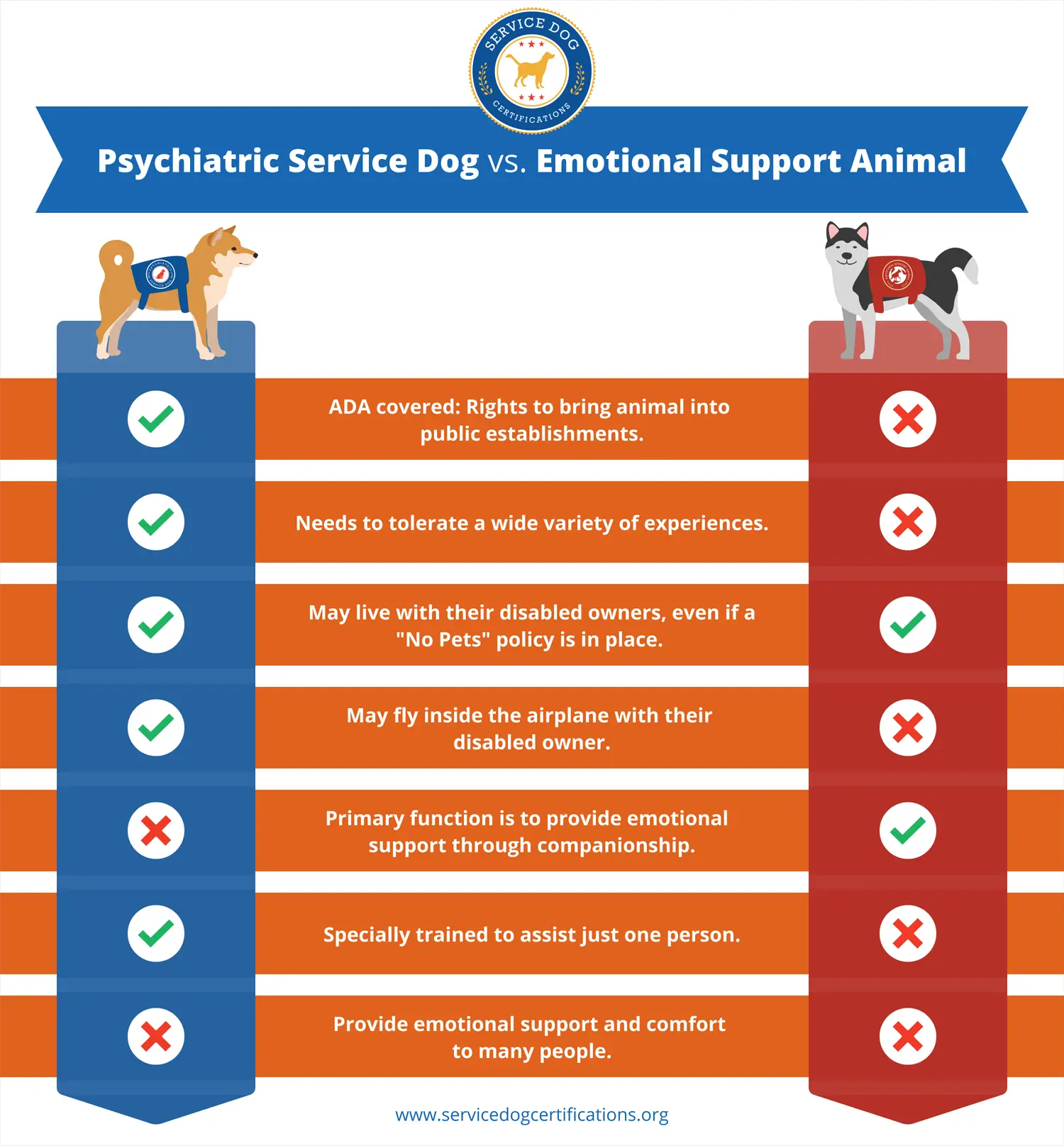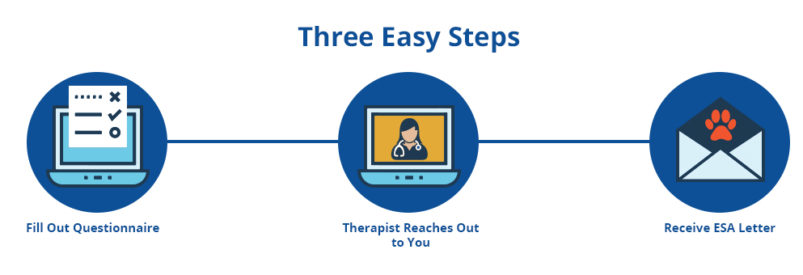The Difference between a Psychiatric Service Dog and an Emotional Support Animal

Dogs have historically performed all manner of tasks to assist humans in a variety of situations. For centuries farmers have used the intelligent and energetic nature of Border Collies to help them round up their livestock. Dogs are also incredibly useful in the treatment and therapy of various disabilities, both physical and mental. Perhaps the most well-known of these is the use of a specially trained dog to lead and assist its blind owner. However, dogs can be prescribed and recommended to patients to help treat their psychological disorders. There is often much confusion between the categories they fall under – Psychiatric Service Dogs and Emotional Support Animals. What are they exactly, and what are their differences?
If both categories are specifically aimed at alleviating the symptoms associated with various psychological disorders, how can they be differentiated? This question has led to many heated debates and confusion as to the rights of their owners and where the can and cannot bring their animals.
Share this image on your site
They both help to improve the mental health of their owners
As both Psychiatric Service Dogs and Emotional Support Animals are both provided to individuals to assist them in some way with psychological issues, it is easy to understand why some people may not understand the differences between them.
What is a Psychiatric Service Dog?
Dogs are commonly used to assist physically disabled people with everyday tasks, making their lives much easier than if they didn’t have them to help. These dogs are specifically trained to perform their designated tasks and behave considerably much better than typical pet dogs. All Service Dogs are protected under the Americans with Disabilities Act (ADA), allowing them to be exempt from most pet-related restrictions such as housing providers with a ‘no pet’ policy. This doesn’t apply only to physical disabilities, but to psychiatric disabilities as well. Psychiatric Service Dogs are therefore used by individuals whose mental impairment is so severe that it affects their ability to perform everyday tasks.
An example of this would be a mentally disabled person with a tendency to wander off in any direction when disoriented – a Psychiatric Service Dog would be trained and assigned to the individual to prevent them from walking onto busy roads.
What is an Emotional Support Animal?
While serving a similar service, Emotional Support Animals assist their owners as a part of their treatment plan. They do not assist individuals with everyday tasks, but rather they provide emotional comfort and help to improve the symptoms of certain psychological disorders.
The only physical aspect an Emotional Support Animal might provide, in contrast to a Service Animal, is that they may provide physical affection on command, or respond to playful activities. Emotional support animals do not have the same level of access as service dogs and are only allowed in planes for travel and in homes that normally do not allow pets.
How to get an ESA Letter Online
Federal Law sees both categories very differently
In the eyes of the law, it is only Service Dogs that are exempt from public restrictions for animals. For example, in usual circumstances, people are not allowed to bring their pets on board when flying on commercial airlines – they must transport them separately. However, the Americans with Disabilities Act stipulates that disabled individuals may travel with their certified Service Animals.
As Emotional Service Animals are merely assigned to people undergoing a therapeutic treatment plan or to provide emotional stability, and are not specially trained or certified, the ADA does not recognize them as a physical necessity. Therefore, Emotional Support Animals and their owners do not have the same overall rights as Psychiatric Service Dogs, although there are some exemptions.
While Psychiatric Service Animals may accompany their owners in public accommodation such as hotels, Emotional Support Animals may not. However, there are certain exceptions regarding private accommodation.
Many landlords and housing providers may often have a ‘no pets’ policy within their accommodation, but these policies can often be bypassed when it comes to Service Animals and Emotional Support Animals due to their prescribed therapeutic assistance to their owners.
Psychiatric Service Animals and Emotional Support Animals serve similar purposes, but have very different rights
While both Psychiatric Service Animals and Emotional Support Animals are prescribed to their owners to assist them with mental impairments, it is apparent that they are designated to serve different purposes. Individuals who have been diagnosed with a psychiatric disorder that is severe enough to impair their daily functioning will typically be assigned a Psychiatric Service Animal to assist them in their day to day activities, and are recognized by the ADA. By contrast, Emotional Support Animals do provide their owners psychological stability and therapy, but are not recognized by the ADA and therefore do not have as many rights under Federal Law.
About the Author: The writing team at Service Dog Certifications is made up of folks who really know their stuff when it comes to disability laws and assistance animals. Many of our writers and editors have service dogs themselves and share insights from their own experiences. All of us have a passion for disability rights and animals.
Related Articles

How to Qualify for An Emotional Support Animal
To qualify for an emotional support animal under the Fair Housing Act, you need to follow these three steps: The most important step is getting an ESA letter that meets HUD’s housing rules for emotional support animals. Make sure your ESA letter has the following: You should also ensure that your ESA letter is not […]

Read More

How to Get an Emotional Support Dog Letter
To make your dog your official emotional support animal, you need a signed ESA letter from a healthcare professional. That might sound like a lot of work at first, but getting an emotional support dog letter really just involves three easy steps: Let’s break down each of these steps so you know exactly what to […]

Read More

What to Do if Your Landlord Does Not Accept Your Emotional Support Animal
If your landlord has said no to your emotional support animal, there’s no need to panic; HUD’s rules are on your side. In this article we’ll let you know what you need to do and provide templates for you to smooth communications with your landlord. In this article: Keep in mind that most but not […]

Read More




i think that every one with emotional struggles should have a support animal and because it makes them feel safe and it help to have something there to hug.
It does not make sense to me of an ESA. I people need not only emotional support at home but more so Outside of home. I have a little dog which gives me such confidence to socialize.Before if I was hungry I would go round and round and could not get myself to eat. I’d go home and spend all day without eating or eating some junk food. With my little dog I go into the restaurant (outdoor seating) and eat. I don’t qualify for service dog. ESA. But I need the support outside. Inside my home I’m safe. Confused
Can you train a dog that is already in the home? I am bi-polar and have PTSD, anxiety disorder and depression. Where would I go to have a dog or even my puppy trained for that a psychological service dog? Or would I need a emotional support animal letter? I need guidance for this. Would you please help me with this? Thank you.
Yes, There are some training facilities that provide Service Dog training for your dog, and some that provide both. Depending on the facility though, I recommend you double check and maybe send them an Email. If not keep searching! Don’t give up! if all else fails you can always train your dog yourself at home, then get it ADA certified.
Hope this helped, though its late!
Good Luck!
Jay, I don’t think that the operator of this site actually provides training. You can use this site to collect information about the differences between emotional support animals, therapy animals, and trained service animals. Truth be told, the documentation sold here is not required under the law, and does little to identify your animal’s training or legal status. It may smooth some interactions at some airline terminals or some rental facilities, where people don’t understand the laws around access to service animals, but that is about it. You should seek a local dog trainer to answer questions about obtaining a trained dog, or whether your puppy is a good candidate for training. There is nothing in the law that requires formal or professional training. What is clear is that the animal must be specifically trained to provide a service or complete a task that is directly related to your disability.
I am 16 and have sever anxiety, depression, and social anxiety that makes me have panic attacks. Do I need a service dog or emotional support dog?
That seems like a question that you should talk to your therapist and family about.
This distinction will be moot shortly because the airlines are pushing to eliminate any rights for emotional support animals. The federal government is taking comments on changes to the ADA so that the airlines can charge for the animals. Comments are due by April 6, 2020. This is the link to comment on this change: https://www.servicedogcertifications.org/wp-content/uploads/2017/05/servicedog_ESA_therapydog.jpg
Hoping to get my dog registered as an ESA. I’m diagnosed with panic disorder, anxiety, and crippling obsessive compulsive disorder. do you think I qualify?
For anxiety and compulsive disorders, an ESA could be beneficial. But to qualify for an ESA, your licensed mental health professional must diagnose your mental health disability and agree that a dog would be helpful as your treatment. Once approved, your therapist will issue an ESA letter, which will make you eligible for owning an ESA. You may find this article on how to qualify for an ESA interesting.
https://www.servicedogcertifications.org/how-to-qualify-for-an-emotional-support-animal/
I already have a note that allows me to have an emotional support animal in my home. However, I had to replace her when we had to put her to sleep. My new dog has had a litter of puppies, that we would like to train as either an ESA, or as an PSA. What do we have to keep the 6 week old pups until they are old enough to train for these type of service animals?
But what do you do if you and your dog fall somewhere in between? My dog isn’t trained for specific tasks but I can’t function without him nonetheless. What am I to do when I simply need my dog’s presence to be able to do what normal people take for granted? I don’t have the same rights because I only need his presence and not specific tasks? That seems unnecessarily cruel.
Did I need to show my service dog skills in order to be allowed entrance into a business?
No, third parties cannot require you to have your dog demonstrate its disability related task as a condition to entry.